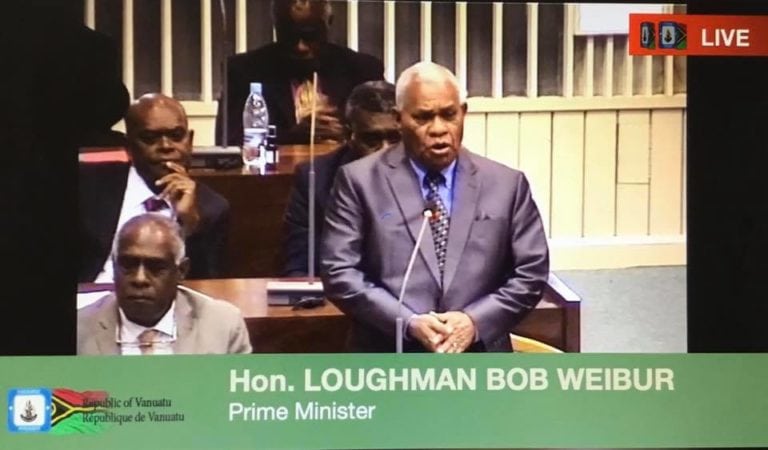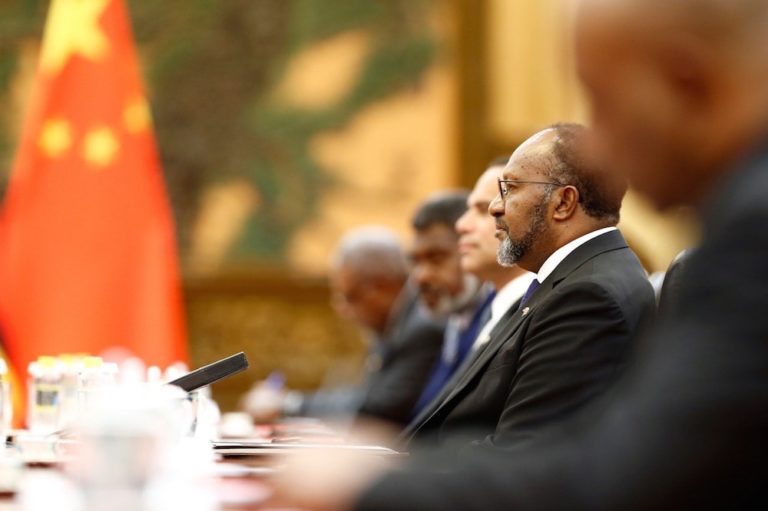(PINA/IFEX) – PINA has defended its right to criticise the intimidation of the news media in Vanuatu, despite a Vanuatu Government demand for PINA not to interfere. The dispute began following an assault on the publisher of the country’s main independent newspaper, the twice-weekly “Vanuatu Trading Post”, by an associate of Deputy Prime Minister Willy […]
(PINA/IFEX) – PINA has defended its right to criticise the intimidation of
the news media in Vanuatu, despite a Vanuatu Government demand for PINA not
to interfere. The dispute began following an assault on the publisher of the
country’s main independent newspaper, the twice-weekly “Vanuatu Trading
Post”, by an associate of Deputy Prime Minister Willy Jimmy.
**Updates IFEX alert of 5 May and 29 April 1999**
On 10 May 1999, PINA president William Parkinson told Radio Australia it is
one of the roles of PINA to help journalists and news media who come under
pressure or attack. Parkinson said: “Very often governments get very
uncomfortable when we place them under this kind of scrutiny and we often
get comments like the one…from Vanuatu. But the reality is that media
freedom is not just a local issue. It’s an international issue. It’s a
reflection of how a democracy is functioning and how an economy is
functioning.”
On 6 May, the Vanuatu Government had called PINA’s statement of 5 May
patronising and called for PINA not to interfere in a “small local issue.”
It said the Vanuatu Government deplores physical violence against any
individual and provides the means for redress when offences have taken
place. It also deplores any attempt to restrict freedom of expression and
also urges all media and news associations to show responsibility in their
reporting.
Parkinson said PINA responded to a call for help from one of its members.
PINA had urged Vanuatu Prime Minister Donald Kalpokas to take immediate
action against the intimidation of the local news media, and especially
pressure on the “Vanuatu Trading Post”. PINA deplored the physical assault
on publisher Marc Neil-Jones and the threats to the newspaper and its staff.
PINA totally condemned statements made by Deputy Prime Minister Jimmy,
called these disgraceful, and urged Prime Minister Kalpokas to do likewise.
Background Information
News organisations in Vanuatu have faced intimidation and threats from
Deputy Prime Minister Jimmy and his supporters, the “Vanuatu Trading Post”
reported on 29 April. It stated that on 25 April, a former business
associate of Jimmy assaulted Neil-Jones. Neil-Jones was talking to Jimmy at
the time but Jimmy was not involved in the attack, the newspaper said.
Neil-Jones filed an assault charge and alerted the country’s independent
Ombudswoman, the report stated.
The “Trading Post” said that it subsequently received a telephone call with
a blunt message from Jimmy, through an associate, stating that his name was
not to be mentioned with the news of the assault, otherwise the place would
be smashed up and there would be problems. Peter Sali, a political advisor
to Jimmy, also visited the “Trading Post” office, accompanied by the police,
to deliver a message from Jimmy stating that his name was not to be
mentioned. The “Trading Post” said that the Ombudswoman is looking at the
allegations of threats to the newspaper. The Ombudswoman had advised that,
unless the police were laying formal charges, they should not be issuing
warnings to anyone on behalf of politicians.
According to the “Trading Post”, Deputy Prime Minister Jimmy then accused
Neil-Jones, who is British, of being a “racist” with a “neo-colonial
mentality towards all indigenous Melanesian people.” He accused Neil-Jones
of being the “mouthpiece” for the country’s Ombudswoman, who has issued a
number of reports condemning the conduct of Vanuatu leaders and politicians.
“Someone will have to pay the price of this democracy one day soon,” it said
Jimmy warned. “Vanuatu cannot continue to tolerate such people.”
Staff from the government’s Vanuatu Broadcasting and Television Corporation
have also reportedly been intimidated by people associated with Jimmy, the
“Trading Post” said (see IFEX alerts of 16 March, 13 February and 13 January
1998). It also said that a non-governmental weekly newspaper, “Nasara”,
which it described as being owned by the “opposition”, had reported threats
and intimidation.
Vanuatu is the former joint British and French-ruled condominium of the New
Hebrides. Following independence in 1980, its news media were largely
government controlled. But in recent years a growing independent news media
has emerged, led by the “Trading Post”. The newspaper has reported a number
of political scandals involving Jimmy.


